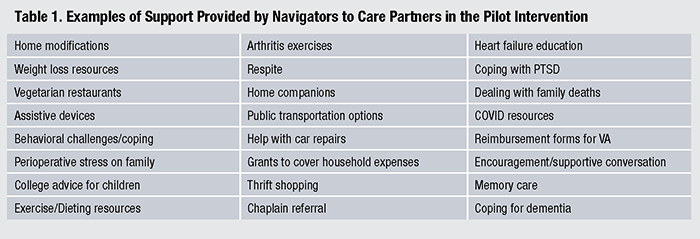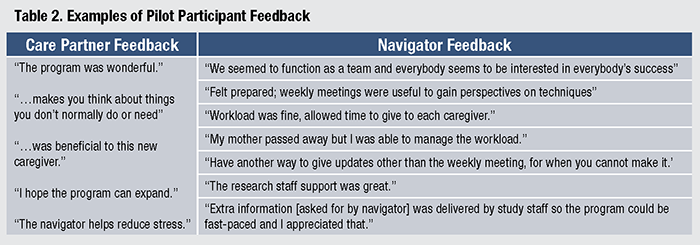
|
|
Innovation UpdateHelping Informal Caregivers Navigate the Serious Illness of Older VeteransHow care partners are supported is a signifcant concern in VA and beyond. Care partners – those friends and families called upon to provide daily care for Veterans – face challenges in that complex role. Care partners’ social and practical needs (e.g., food, clothing, transportation, utilities, housing/yard maintenance) present challenges, and health systems are not necessarily prepared to provide these types of support. Trained navigators may be able to help care partners connect to available services and supports in VA and in their respective communities. Our 2021 study examined the feasibility of using navigators to support Veteran care partners. The study looked at the work of nine virtually trained human navigators who remotely helped 38 (30 completed 12- week intervention) care partners negotiate resources within VA and their communities across 12 North Carolina counties. In terms of demographics, 57 percent of the navigators were African American and 63 percent were 65 years or older. The 38 care partners involved in the study cared for Veterans 65 years or older with serious illnesses, including advanced stage congestive heart failure (CHF), chronic obstructive pulmonary disease, dementia, and solid tumor cancer (~ 25 percent of each diagnosis enrolled). Half of the care partners were enrolled in a formal Caregiver Support Program; half were not. Table 1 lists examples of navigator support provided to care partners during our pilot. Navigators provided this support by telephone due to COVID-19 and distance, an approach that was well-received by study participants. Table 2 shows representative feedback from care partners and navigators in the pilot. Care partners rated satisfaction highly (mean: 4.6/5 at six wks; 4.7/5 at 12 wks) and navigator-care partner bonding highly as well (mean: 4.5/5 at 6 wks; 4.5/5 at 12 wks). Caregiving burden on the Caregiver Reaction Scale was 1.96 (base), 1.82 (6 wks), and 1.62 (12 wks). Results of the Zarit Burden Interview were 31.2 (base), 27.4 (6 wks.), and 27.3 (12 wks). Each navigator worked with three to four assigned care partners per week over the study course. Time per week spent by navigators on the phone with a care partner or related to a specifc care partner (including contacting agencies on the care partner’s behalf) averaged 32 minutes per week. Internet time researching services and supports for a specifc care partner averaged 23 minutes per week. Overall, the navigation pilot provided 86 hours of phone time to care partners by navigators and 45 hours of online time gathering information for care partners. During weekly check-ins within the 12-week study period, navigators reported connecting care partners to needed supports ~80 percent of the time. This study showed the feasibility of using trained navigators to support care partners of Veterans with serious illness. The next step is to show that this intervention is effective in meeting care partner needs and in decreasing their caregiving burden. Dr. Boucher is currently applying for VA funding to conduct a randomized controlled trial of this intervention model in the Durham VA Health Care System. 

|
|